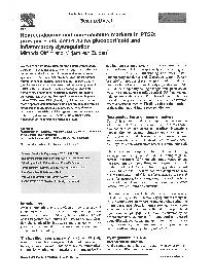Neuroendocrine and neuroimmune markers in PTSD : pre-, peri- and post-trauma glucocorticoid and inflammatory dysregulation
We review current knowledge on how posttraumatic stress disorder (PTSD) is associated with dysregulation of the most commonly studied markers of the endocrine and immune systems pre-, peri- and post-trauma. Lower basal cortisol output, enhanced glucocorticoid receptor function, and a proinflammatory state have been most consistently found in PTSD, with considerable variability among studies and participants. Longitudinal research is scarce, but there is converging evidence that biological dysregulation is present before PTSD onset. Biological dysregulation may become more apparent with increasing time since trauma, and may be reversible with and predict effective treatment. However, considering the variability of findings and the complex interplay of these systems with other factors, the current clinical application of these findings remains limited.
Geachte bezoeker,
De informatie die u nu opvraagt, kan door psychotraumanet niet aan u worden getoond. Dit kan verschillende redenen hebben,
waarvan (bescherming van het) auteursrecht de meeste voorkomende is. Wanneer het mogelijk is om u door te verwijzen naar de bron
van deze informatie, dan ziet u hier onder een link naar die plek.
Als er geen link staat, kunt u contact opnemen met de bibliotheek,
die u verder op weg kan helpen.
Met vriendelijke groet,
Het psychotraumanet-team.
In: Current Opinion in Psychology, ISSN 2352-250X | 14 | April | 132-137
https://doi.org/10.1016/j.copsyc.2017.01.001


